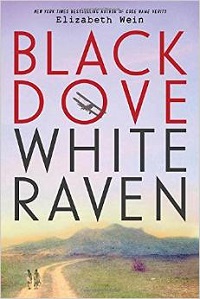| ________________
CM . . .
. Volume XXI Number . . . .June 19, 2015
excerpt:
Rhoda and Delia are female pilots who make a name for themselves with wing-walking and other barnstorming stunts. Their career is abruptly cut short in 1927 when a bird causes the plane to crash and only Rhoda survives. By 1930, Rhoda has moved their two children, Emilia and Teo, to Ethiopia because it was Delia’s dream that her son be able to live among his own people there. In the beginning, life is pleasant, and the children enjoy their peaceful Ethiopian adventure. But by the mid 1930’s, war with Italy is looming on the horizon, and both Em and Teo find they are drawn into the conflict. As in her previous young adult novels, Rose Under Fire and Code Name Verity, Elizabeth Wein gives her readers strong main characters. Rhoda leaves her Quaker background and her American lifestyle in order to make a new home in Ethiopia, and this confidence and bravery are echoed in both Em and Teo. By 1935, both young people are teenagers who can fly planes and who have strong convictions regarding their new home and the imminent invasion by Mussolini and Italian forces. They may not be true siblings, but they are the very best of friends and are willing to do whatever is necessary to help and protect one another, whatever the circumstances. Readers sense that one could hardly survive without the strength of the other. The title refers in part to the barnstorming act of the two mothers, one of whom is white and the other black. Em and Teo adopt these identities both in the fictional stories they create and also in their real lives. One of the reasons for the move to Ethiopia is the racism existing in America at the time which Em and Teo and their mothers encountered frequently. In the story, the dove is pictured as black and the raven as white, a complete reversal of what is expected. Em becomes the White Raven of dangerous missions and many disguises while Teo is the Black Dove, content to be invisible and just fit in as much as possible. The question of slavery adds to the racial tension in the book as well. The title reverses the expected colours, and, within the novel, the gender roles are also contrary to what readers might expect. In fact, the stereotypes of gender are another major theme of the book. The adult pilots at the beginning of the book are both female, and Rhoda is a strong, feisty woman who is not only capable of leaving her relatively comfortable and familiar American home but who risks all by moving herself and the children to a faraway place where everything – customs, language, religion – is new and different. Once there, she becomes involved in a medical clinic and never backs down, even when war threatens herself and her family. She is fiercely protective of the two children, yet she doesn’t let this stop her from doing whatever is necessary. She is mirrored in Em, who doesn’t hesitate to write to Haile Selassie asking for a passport for Teo and, by the way, returning the plane she has stolen from him. The historical and geographical setting of Ethiopia in the 1930’s will be unfamiliar to most young adult readers, and so Wein opens new doors. The historical timing is important as a regional war looms throughout the book, and readers will understand that this is just the overture to World War II’s onset in 1939. The country of Ethiopia is almost another character in the novel. The coffee plantation of Tazma Meda, the insights into the local religion and festivals, the bustle of Addis Ababa and the airfields scattered throughout the country all help the story come alive. Readers enjoy the calm and sunshine of the countryside as well as witnessing the colours, smells and sounds in the metropolis of Addis Ababa. Once again, Elizabeth Wein gives her readers excitement, thrills and intrigue along with a story about strong ties among friends and family. She doesn’t shy away from confronting the issues of war and gender inequality and racism, but, like the planes which are so much a part of the book, she enables her characters and, therefore, her readers to both see them and to rise above them. Highly Recommended.
Ann Ketcheson, a retired teacher-librarian and high school teacher of English and French, lives in Ottawa, ON.
To comment on this title or this review, send mail to cm@umanitoba.ca.
Copyright © the Manitoba Library Association. Reproduction for personal use is permitted only if this copyright notice is maintained. Any
other reproduction is prohibited without permission.
CM Home |
Next Review |
(Table of Contents for This Issue - June 19, 2015.)
| Back Issues | Search | CM Archive
| Profiles Archive |
